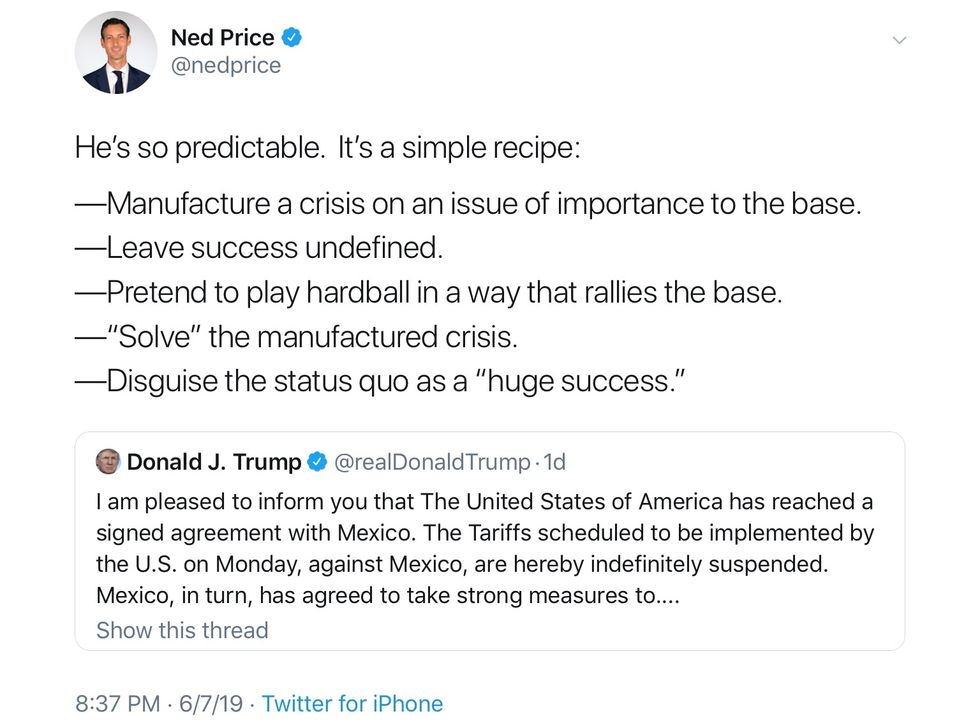President Trump has threatened and bludgeoned his way into an unwanted confrontation with the U.S. business community that could have far-reaching implications for the future of presidential power over trade.
Driving the news: Trump's blunt use of presidential leverage to force the Mexican government to harden its immigration enforcement appears to have caused an unintended side effect: U.S. business leaders have begun urgently discussing strategies to claw back the virtually unchecked trade powers that Congress has handed over to presidents during the past 80 years.
The big picture: Even though the business community is now breathing a sigh of relief that Trump won't be hitting Mexico with new tariffs, the last week of Trump's threats may have a longer lasting effect, according to industry sources who have met with corporate representatives in Washington, leaders of business associations, administration officials, members of Congress and their senior staff.
- Trump's threat to impose rising tariffs on all Mexican goods to punish the Mexican government for soft immigration enforcement sparked a widespread panic in the U.S. business community and turned their conversations in an unprecedented direction, these sources said.
- John Murphy, who runs international policy at the Chamber of Commerce, tweeted, "In the space of a few hours ... more than 140 business and agricultural associations signed this statement opposing tariffs on goods from Mexico."
- "Maybe folks in the White House don't know this, but they freaked out a lot of people," a trade lawyer involved in these conversations told me.
"This is a real turning point because this is threatening tariffs using an emergency power," said another top industry source involved. "That's never been done before. Part of the resources that we want to direct our advocacy to ... is for Congress to take back authority over tariffs."
- "We can get back on USMCA and try to pass the thing and we can all be hunky-dory, but I think you're going to see a longer term business community effort to help Congress reassert its authority on tariffs."
- Legislation could go so far as requiring congressional approval of most presidential trade actions. (We're already seeing some efforts along these lines, led by Republican Sens. Chuck Grassley and Pat Toomey.)
Behind the scenes: Before Trump called off his tariffs on Friday night, a loose coalition of organizations supporting Trump's renegotiated NAFTA, the United States–Mexico–Canada Agreement, were discussing halting a multimillion-dollar campaign to support the passage of USMCA.
- Instead, these business lobby groups and leaders of large corporations were discussing redirecting their money toward opposing Trump's tariffs and potentially to support efforts to claw back the president's trade powers, according to sources familiar with their internal discussions.
- They will now return to funding a USMCA campaign, but the past week has shown them that they need to finally get serious about stopping this president — and future presidents — from unilaterally raising tariffs.
Why it matters: Trump can only credibly threaten foreign countries with abrupt tariffs because Congress has gradually given away its trade powers. Opponents of this trend say it's unconstitutional because taxing and commerce authority lies with Congress (as expressed in Article 1 of the Constitution).
- Until fairly recently, only a wonky fringe in Washington cared about this issue. Few paid attention when Republican Sen. Mike Lee introduced legislation in early 2017 to "subject all executive branch trade actions (including raising tariffs) to congressional approval."
The bottom line: Over the past week, these previously fringy conversations entered the mainstream. Watch for a long-term, well-funded campaign to peel trade powers away from the president.
Jonathan Swan. Axios. June 10, 2019
###
Voices4America Post Script. Trump's self-serving, reckless manipulation of tariffs is having repercussions. First, he devastated our farmers. Then, though he crawled back on Mexican tariffs, even business leaders now know we are not safe from his attacks on the economy if he thinks it will help him.
You may want to remember this analysis by Ned Price, the next time Trump manufactures a crisis. Always remember too that the “deal” he proclaimed as his victory against Mexico occurred in December 2018 while the Trump threat of accelerating tariffs against Mexico occurred in June 2019.

In today’s Times, though, as Peter Baker reminds us, sometimes he does more than bluff and bluster.
“Still, it would be a mistake to assume they are always bluffs. The president has followed through on plenty of threats, as when he slapped steel and aluminum tariffs on American allies and withdrew from Mr. Obama's nuclear agreement with Iran and Paris climate change accord. Mr. Trump backed off a threatto increase tariffs on China last winter, but when further talks stalled, he followed through on it this spring.
He repeatedly talked about shutting down the government to extract money for his border wall from Congress and then finally did so in December. Of course, it did not produce the result he desired; after 35 days, he retreated and reopened the government without more money for the wall than he had already secured. He then followed through on a threat to declare a national emergency and spend money on the wall anyway.”
Here is Peter Baker’s full analysis of the danger #DerangedDonald really presents.https://www.nytimes.com/2019/06/09/us/politics/a-drama-of-trumps-own-making-ends-with-a-familiar-hero.html?smid=nytcore-ios-share
#ImpeachTrumpNow #BlueWave2020

